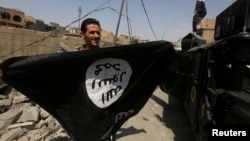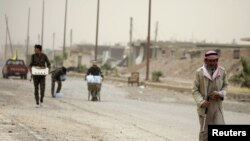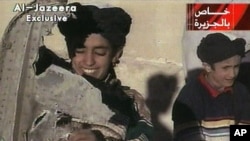"If they are in Raqqa, they're gonna die in Raqqa."
America's top envoy to the coalition battling the Islamic State, Brett McGurk, declared last month open season on the terror group's foreign recruits in the besieged northern Syrian city.
More than 2000 IS militants are believed still to be fighting in Raqqa, many of them thought to be foreigners from North Africa, the Middle East and Central Asia. But even after the Islamic militants are defeated in the coming weeks in their self-styled Syrian capital, the terror group still will have an estimated 13,000 or so fighters in Syria and Iraq, posing a remaining threat in the Levant, warn U.S. officials and independent analysts.
They expect the terror group to revert back, in the words of analyst Bruce Hoffman, to its "fundamental DNA" as "a terrorist-cum-insurgent group, not a proto-state exercising sovereignty." Most of the leadership hasn't stood to fight in Raqqa, as it didn't in Mosul, fleeing both cities to set up in remoter territory and smaller towns along the Syrian-Iraq border in the Euphrates River Valley and Iraq's western Anbar province.
Defeated, not eradicated
IS hopes to emulate its precursor jihadist organizations, which were able to weather military defeats inflicted on them by U.S. forces during the 2007-08 surge in Iraq.
IS's official spokesman, Abu Mohammad al Adnani, before his death in a targeted drone strike last year, referenced the strategy in an audio-message to followers, referencing the 2007 U.S. Surge, saying: "Were we defeated when we lost the cities in Iraq and were in the desert without any city or land? …It is the same, whether Allah blesses us with consolidation or we move into the bare, open desert, displaced and pursued."
Analysts expect IS to exploit strategic depth in rugged territory both in west and east Iraq — including the Jalam desert east of Samarra and in the Hamrin mountains — to launch hit-and-run attacks from villages and hideouts on government forces, as the group began to do in April.
Whether it can hang on will likely depend on two key factors — the effectiveness of anti-IS security forces on both sides of the border and the attitude of the locals. Heavy-handed counter-insurgency operations, along with revenge killings and sectarian-based governance, risk feeding into the Sunni disaffection that gave rise to IS in the first place, breeding yet more new recruits for the terror group and giving it a chance to recover and reconstitute itself.
Stability is key
Analysts worry that neither Baghdad nor Washington have developed coherent stabilization plans involving transitional justice and inclusive governance ready for Mosul and other towns grabbed back from IS.
"We should be concerned about the lack of stabilization plans for territory from which ISIS is expelled," says Daveed Gartenstein-Ross, a counter-terrorism analyst with the Foundation for the Defense of Democracies, a Washington-based think tank. "We are in grave danger of once again winning the war but losing the peace. Absent stabilization plans... well, we've seen this movie before. In addition, the U.S. should take steps to counter atrocities that Iranian-backed forces, including the popular mobilization committees that have been a part of the anti-ISIS offensive, may commit against Sunni civilians," he adds.
In northern Syria, Washington would appear to be adopting more of a hands-off off approach when it comes to civilian affairs in Raqqa once the U.S.-backed Kurdish-dominated Syrian Democratic Forces, or SDF, have secured the city. In an email, a spokesman for Central Command, or CENTCOM, said: "When ISIS has been defeated in Raqqa, authority will rest with the Raqqa Civilian Council and security will be maintained by the Raqqa Internal Security Force."
When asked whether U.S. authorities have discussed the treatment of IS suspects, the CENTCOM response was: "Detainees are handled by local authorities." But it added: "The Coalition supports the laws of armed conflict and works hard in training to ensure partner forces are aware of and understand the requirement for a professional fighting force to abide with these laws."
Violations are already being alleged, as VOA reported earlier this week, with some locals saying they are confronted by an immediate assumption that they must be IS members or sympathizers as they remained in the city under militant rule.
In Iraq, rights groups have already documented revenge killings by some Iranian-influenced Shi'ite militias. And a recent video of brutal Iraqi interrogation methods of suspect militants in Mosul is adding to the alarm of rights groups. On both sides of the border, IS will be quick capitalize on Sunni grievances.
Which is the top terrorist group?
"Outside of the Syria-Iraq theater, expect the group to try to continue to demonstrate that it is the foremost jihadist terrorist organization," says Gartenstein-Ross. "Terrorist attacks across the globe demonstrate its potency, relevance, and in ISIS's estimation are likely to draw more recruits to its cause," he adds.
Like rival al-Qaida before, IS has established affiliates elsewhere in the Mideast and North Africa, notably in Libya and Egypt, readying for a long war. Last year, IS leader Abu Bakr al-Baghdadi assured his followers in a rare audio message that the group would defeat efforts to oust it from its major population centers in Syria and Iraq but appeared to be preparing for their eventual loss by urging foreign recruits to migrate to the affiliates.
Whether IS once its caliphate has been crushed and its nation-building pretensions shattered remains as alluring for militant recruits is one of the big questions.
The caliphate ambitions marked it out as different from al-Qaida, allowing it to boast that it had gone one better than Osama bin Laden. Aside from doctrinal objections, al-Qaida strategists opposed the establishment of the caliphate from the beginning because tactically they calculated its foes would quickly invade and crush it, as is happening.
Now al-Qaida will likely seek to demonstrate that it and not IS is the foremost global jihadist group and has already been grooming, some analysts argue, bin Laden's 28-year-old son Hamza as a figurehead leader, featuring him in four recent propaganda videos for the group.







